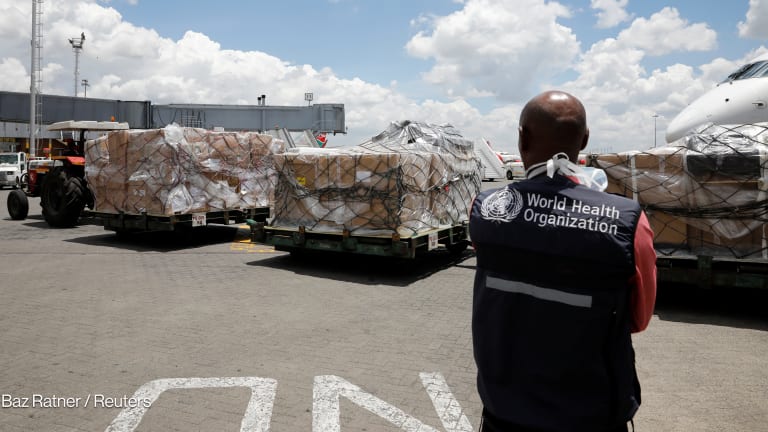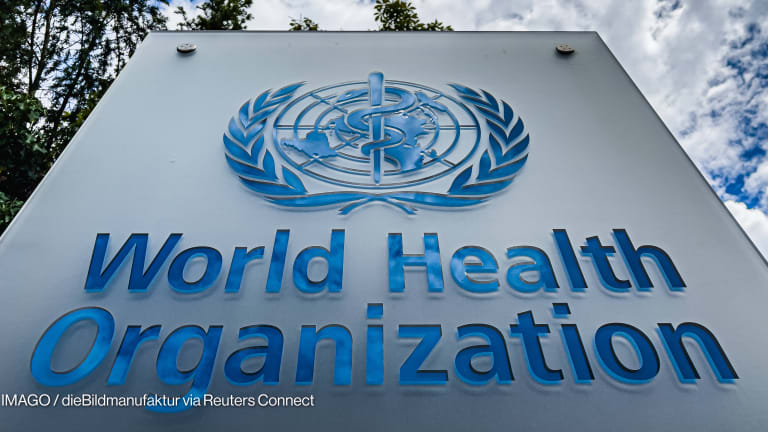
MANILA — The World Health Organization has revamped its senior management structure.
The revamp, laid out in an internal memo sent to staff and seen by Devex, includes the creation of new positions and divisions which will help WHO achieve its triple billion targets in its new five-year strategic plan.
Zsuzsanna Jakab, currently regional director at WHO in Europe, will be the new deputy director-general.
Soumya Swaminathan and Jane Ellison, who currently serve as deputy director-generals, will be taking on new positions. Swaminathan will be chief scientist, heading the new chief scientist division created to strengthen WHO’s core scientific work and ensure the quality and consistency of WHO’s norms and standards, according to a news release. Ellison will now be executive director for external relations and governance.
Peter Salama, who’s been leading WHO’s health emergencies program since 2016, is now executive director of a new program pillar, Universal Health Care and the Life Course. He will be reporting to both Director-General Tedros Adhanom Ghebreyesus and Jakab. Dr. Samira Asma has been appointed as new assistant director-general for data, analytics, and delivery.
While Bernhard Schwartländer will continue in his position as chef de cabinet, it’s unclear what happens to Professor Lubna Al-Ansary, assistant director-general for metrics and measurement. Dr. Joy St John, assistant director-general for climate and other determinants of health, was also missing in the list.
Much of what’s been announced was discussed by Tedros during the executive board meeting in January. At that time, member states felt they were being kept in the dark and wanted more clarity and details about the ongoing WHO reform, particularly about anticipated changes to WHO’s structure.
New divisions
The creation of the chief scientist division is expected to offer and improve career opportunities for scientists at the organization. At the executive board sessions in January, Tedros discussed hiring more scientists who will have their own career progression within the organization.
“We don’t want our scientists to compete for director position; we want them to grow through a professional stream,” he said, noting that some of WHO’s staff are scientists but not managers.
“If they are not managers, they shouldn’t be managers,” he said.
Tedros, at that time, also discussed plans of setting up a “WHO Academy” that will provide training to a targeted 10 million public health professionals globally, as well as learning opportunities for staff.
“A normative and technical organization should focus on training or capacity building. But that’s not the case, and we need to have one now. We will start continued professional development in the organization,” he said last January.
WHO has also announced a new department of digital health to support countries to “assess, integrate, regulate and maximize the opportunities of digital technologies and artificial intelligence,” as well as a new division of emergency preparedness to complement WHO’s work on emergency response.
Breaking down silos
Tarik Jasarevic, spokesperson for WHO, said the changes have already been discussed with member states and no longer subject to approval at the World Health Assembly.
At the board sessions, Tedros mentioned a new senior leadership team several times and how there could be a “reshuffling” in management, with the possibility of adding new people.
Member states have stressed the need for transparency from WHO on the transformation process. And WHO’s staff association shared the same sentiment.
“Staff look forward to clear processes across the organization as well as clear communication and consultation that actively engage us and keep us informed on the transformation agenda,” according to a statement made by the association’s representative before member states.
“We believe that as we move forward with the transformation agenda, it is important for staff at all levels and in all duty stations to be fully involved and to have a common understanding of how the various ongoing processes will contribute to ‘making WHO a modern organization that works seamlessly to make a measurable difference in people’s health at the country level,’” the representative said.

At that time, Bruce Aylward, formerly WHO assistant director-general and senior adviser to Tedros on organizational change, summed the transformation agenda as “all about breaking down silos across WHO programs and ensuring the alignment of headquarters, regional, and country offices.”
Peter Singer and Aylward will continue on their roles as advisers to the director-general. The internal memo states that all appointees will be “transitioning in their new roles over the coming days.”
The assistant director-generals taking on new positions and tasks are as follows:
• Ren Minghui, assistant director-general for UHC, communicable, and noncommunicable diseases.
• Nakao Yamamoto, assistant director-general for healthier populations.
• Mariângela Batista Galvão Simão, assistant director-general for prequalification and technology assessment.
• Svetlana Akselrod, lead of the WHO Global Coordination Mechanism on prevention and control of NCDs.
• Michèle Boccoz, special envoy on multilateral affairs.
• Stewart Simonson, assistant director-general who will lead WHO’s office in New York, including on United Nations reform.
• Princess Nothemba Simelela, special adviser on key program areas, including WHO’s work on cervical cancer, sexual and reproductive health, WHO’s leadership at the Global Health Partnership 6 and on the global action plan for healthy lives and well-being for all.
• Ranieri Guerra, assistant director-general who will lead WHO’s preparations for the U.N. high-level meeting on UHC happening in September.
There are also some new names from different WHO offices moving to HQ:
• Hanan Balkhy is the new assistant director-general for antimicrobial resistance.
• Michael Ryan will now head the WHO health emergencies program.
• Jaouad Mahjour is assistant director-general for emergency preparedness and the implementation of the International Health Regulations.
• Ibrahima-Socé Fall is the director-general for emergency response.
• Raul Thomas is the new assistant director general on business operations.








